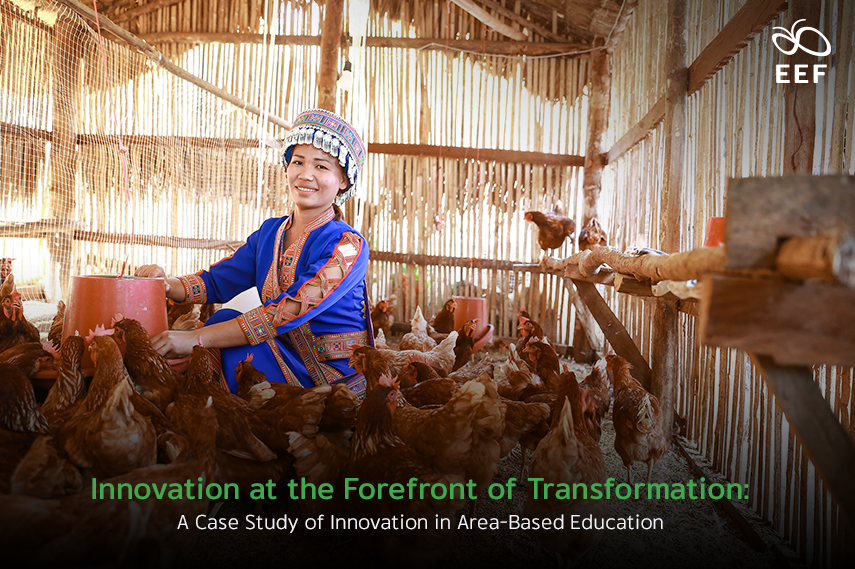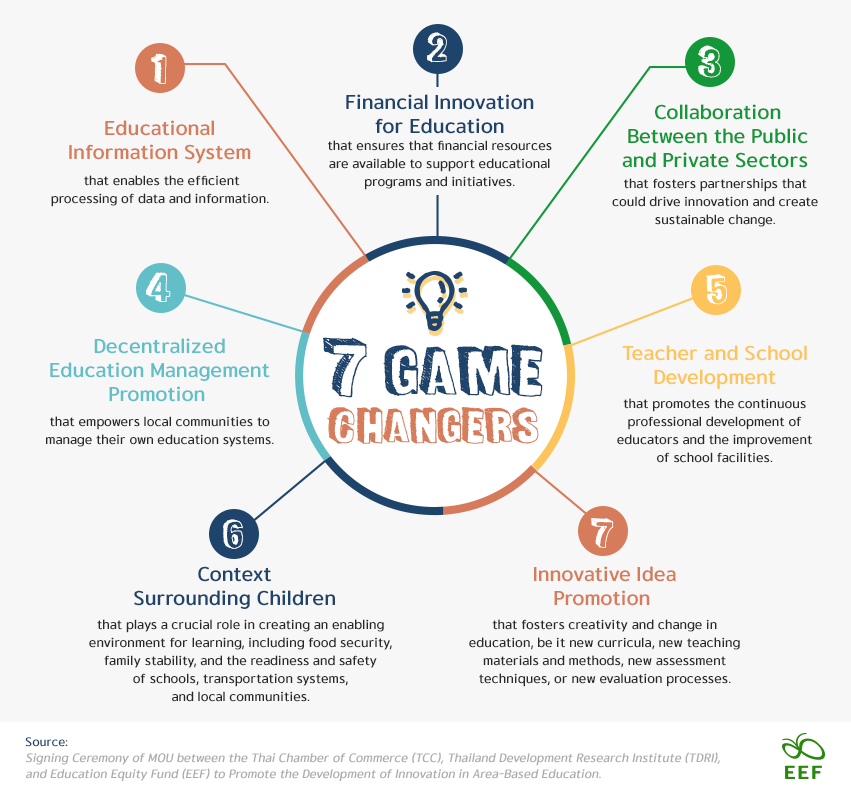
Education is the foundation of stability for individuals and families, and it plays a crucial role in shaping the future of a country. A quality education equips students with the bodies of knowledge, skills, and competencies needed for them to earn a living, provide for their families, and contribute to their countries. A shining illustration of this concept is the “Innovation in Area-Based Education” project in Thailand, which has been proven to be key to empowering students with the necessary tools to keep up with changing times and to ensure a better future for all.
With the advancement of technology in education, teachers’ roles in the Innovation in Area-Based Education have evolved from being mere providers of knowledge to becoming facilitators of learning. No longer are they limited to a fixed set of materials or a set curriculum; Instead, they are using a highly curated combination of multimedia tools to provide their students with a diverse range of opportunities to explore and learn on their own.
This approach allows students to take ownership of their learning and engage with materials that resonate with their personal interests and preferences. As a result, not only are they learning more effectively, but they are also finding a sense of purpose and relevance in what they learn, making education a more fulfilling experience.

The benefits of this innovative approach to education extend beyond just the students. Teachers are also able to grow and develop alongside their students, continually learning new things and staying up to date with the latest technology and trends. This keeps them motivated and engaged in their work, ensuring they always strive to improve their practice and deliver the best possible education to their students.
The shift in focus from traditional teaching to innovative learning, as evidenced in the framework of the “Innovation in Area-Based Education” project, has been proven to have significantly improved both teaching and learning outcomes, making the processes more engaging for both students and teachers and as a result education more meaningful and impactful. The education system is constantly evolving, and innovation is at the forefront of this transformation.
In Innovation in Area-Based Education, innovations in education are tailored to the specific context and cultural traditions of each region, enabling relevant and meaningful curricula to be taught to students so that they can apply what they have learned in their pursuit of livelihoods and businesses, for only then will the economy thrive and prosper. In doing so, it must involve seven game-changers:

1) Educational Information System
that enables the efficient processing of data and information;
2) Financial Innovation for Education
that ensures that financial resources are available to support educational programs and initiatives;
3) Collaboration Between the Public and Private Sectors
that fosters partnerships that could drive innovation and create sustainable change;
4) Decentralized Education Management Promotion
that empowers local communities to manage their own education systems;
5) Teacher and School Development
that promotes the continuous professional development of educators
and the improvement of school facilities;
6) Context Surrounding Children
that plays a crucial role in creating an enabling environment for learning,
including food security, family stability,
and the readiness and safety of schools, transportation systems, and local communities; and
7) Innovative Idea Promotion
that fosters creativity and change in education,
be it new curricula, new teaching materials, and methods, new assessment techniques,
or new evaluation processes.
These seven game changers allow for innovations conceived in each area to be emulated in educational reform policies. Besides, they are crucial for the success of the Policy Value Chain, which aims to create a policy-driven value chain that imparts accurate and relevant knowledge to students daily, leading to a prosperous future for all. It involves three main steps: creating accurate and clear knowledge to generate innovations related to various knowledge domains, experimenting and prototyping these innovative bodies of knowledge, and expanding the results into policy implementation. Following these steps can help to improve learning outcomes for students while also transforming the educational landscape as a whole.
In Thailand, education has been plagued by a significant loss of up to 80 days per year due to mandatory activities outlined in the standard curricula. However, the recent unlocks in the Innovation in Area-Based Education have brought about promising changes that have greatly improved the quality of education. These education spaces have empowered schools to create and implement curricula that cater to their unique needs, different from the standard ones set by the Ministry of Education. This approach has yielded fantastic results, with up to 90% of schools adjusting their curricula and 70% revamping their assessment methods in response. Moreover, the flexibility brought about by these unlocks has given 50% of schools the freedom to purchase teaching materials that are not prescribed by the Ministry, further enhancing the learning experience.
Despite these incredible strides, challenges persist. The current regulations for selecting school directors still use the nomination and selection method, and this has caused significant problems in appointing suitable leaders to develop the education systems of their respective schools and provinces. This, in turn, negatively impacts the overall quality of education in Thailand. It is clear that unlocking these regulations will go a long way in ensuring that competent leaders are appointed to develop the education systems in their schools and provinces. This will result in a more robust education system that will elevate the quality of education across the country.

Investing in education is not a matter of profit and loss, but rather a fundamental need for the growth and competitiveness of Thai youth and Thailand itself. It is comparable to how we all have to eat, rest, and sleep, or else we die. However, for children, education may seem like a loss if it does not prepare them for a satisfying future. Therefore, we must ensure that education does not result in future losses for them. Education is not just about imparting knowledge; Rather, it is about nurturing potential from childhood to the workforce. To achieve this, schools, communities, the government, and society must work together to equip children with the necessary bodies of knowledge, skills, and competencies to thrive in today’s world.

Investing in education means investing in the future of our youth, ensuring that they have the tools to succeed in life. Neglecting education means losing out on a global level, but by investing in it, we can unlock the potential of our youth and secure a prosperous future for all. The use of innovation in transforming the education system is considered one of the hopes for improving the teaching and learning process and keeping up with the changes of the 21st century. Therefore, we must focus on developing learners who can respond to these changes and adapt to new ways of learning. By doing so, we can create a better future for generations to come.
Source:
Signing Ceremony of MOU between the Thai Chamber of Commerce (TCC), Thailand Development Research Institute (TDRI), and Education Equity Fund (EEF) to Promote the Development of Innovation in Area-Based Education.

